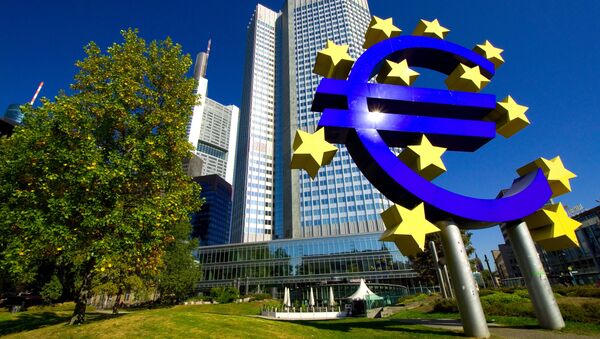MOSCOW, September 4 (RIA Novosti) - The European economy has entered a dangerous phase of stagnation, which could ultimately result in a new financial crisis, experts predict.
"In recent weeks the countries of the Eurozone have begun to take in water once again. Their collective GDP stagnated in the second quarter: Italy fell back into outright recession, French GDP was flat and even mighty Germany saw an unexpectedly large fall in output. The third quarter looks pretty unhealthy, partly because the Eurozone will suffer an extra drag from Western sanctions on Russia," notes the Economist in its article, "That sinking feeling (again)."
Germany, France and Italy are suffering from stagnation and growing deflation, while the British and US economies, by contrast, "are enjoying sustained growth," emphasizes the Economist.
According to Der Spiegel, Germany’s leadership is inclined to blame the EU members, particularly France, for their unwillingness to carry out austerity measures and implement comprehensive structural reforms. Paris, in its turn, criticizes the "too tight" European austerity policies that are backed by Berlin, which have led to a slowdown in economic growth.
"Hollande is seeking to increase pressure on Germany to fundamentally rethink its economic approach for the Eurozone. He wants to convince Merkel to loosen the stability criteria," Der Spiegel stresses, adding that Washington and the International Monetary Fund support the "debt-fueled growth stimulus measures," proposed by Hollande.
It still remains unclear whether such an approach could stabilize the European economy in the long run.
It should be noted that experts unanimously agree that the EU policy of sanctions against Russia are only adding fuel to the fire.
"As the full impact of sanctions against Russia hit the European Union and as the EU attempts to recover from the sovereign debt crisis that nearly destroyed it, the European economy is once again in contraction," the Fiscal Times writes.
The media outlet underscores that some European leaders feel exceptionally frustrated by new demands, issued by Washington and Brussels, to "increase punishment against Moscow," in the face of an economic slowdown in the Eurozone. Some experts point out that boosting economic cooperation with Russia could evidently improve the situation. However the European countries seem unable to make independent, useful decisions, other experts pessimistically remark.
Meanwhile the Economist notes gloomily that, "if the currency union brings nothing but stagnation, joblessness and deflation, then some people will eventually vote to leave the euro," predicting that such a euro crisis "is just waiting over the horizon."



